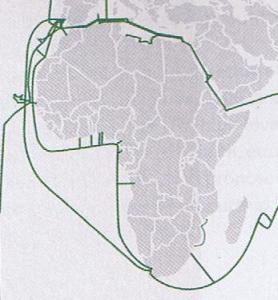 Submarine cables serving Africa in 2007 (APC)This study examining the impact the SAT-3 fibre optic submarine cable has had on telecommunications in four African countries has found that the potential of the cable has not been properly exploited. Instead, ownership of the cable by telecoms incumbents in the countries researched has reinforced their market positions.
Submarine cables serving Africa in 2007 (APC)This study examining the impact the SAT-3 fibre optic submarine cable has had on telecommunications in four African countries has found that the potential of the cable has not been properly exploited. Instead, ownership of the cable by telecoms incumbents in the countries researched has reinforced their market positions.
The study analyses the effect ownership of the South Atlantic 3/West Africa Submarine Cable (SAT-3/WASC) has had on the communications markets in Angola, Cameroon, Ghana and Senegal. It focuses on the ‘Africa section’ of the submarine cable –running along the west coast of Africa down to southern Africa– with a specific emphasis on access and cost.
It recommends fresh measures to liberalise the telecommunications markets in the four countries, with the specific aim of opening up access to SAT-3 to more operators, so that its real potential can be realised in Africa.
The study consists of a briefing and four country case studies:
- The Case for “Open Access” Communications Infrastructure in Africa: The SAT-3/WASC cable – a briefing by Abiodun Jagun
- The Case for “Open Access” Communications Infrastructure in Africa: The SAT-3/WASC cable – Angola case study by Russell Southwood
- The Case for “Open Access” Communications Infrastructure in Africa: The SAT-3/WASC cable – Senegal case study by Ben Akoh
- The Case for “Open Access” Communications Infrastructure in Africa: The SAT-3/WASC cable – Cameroon case study by Peter Lange
- The Case for “Open Access” Communications Infrastructure in Africa: The SAT-3/WASC cable – Ghana case study by Eric Osiakwan